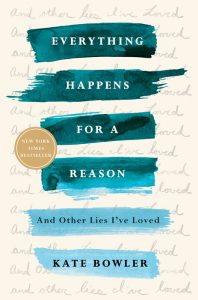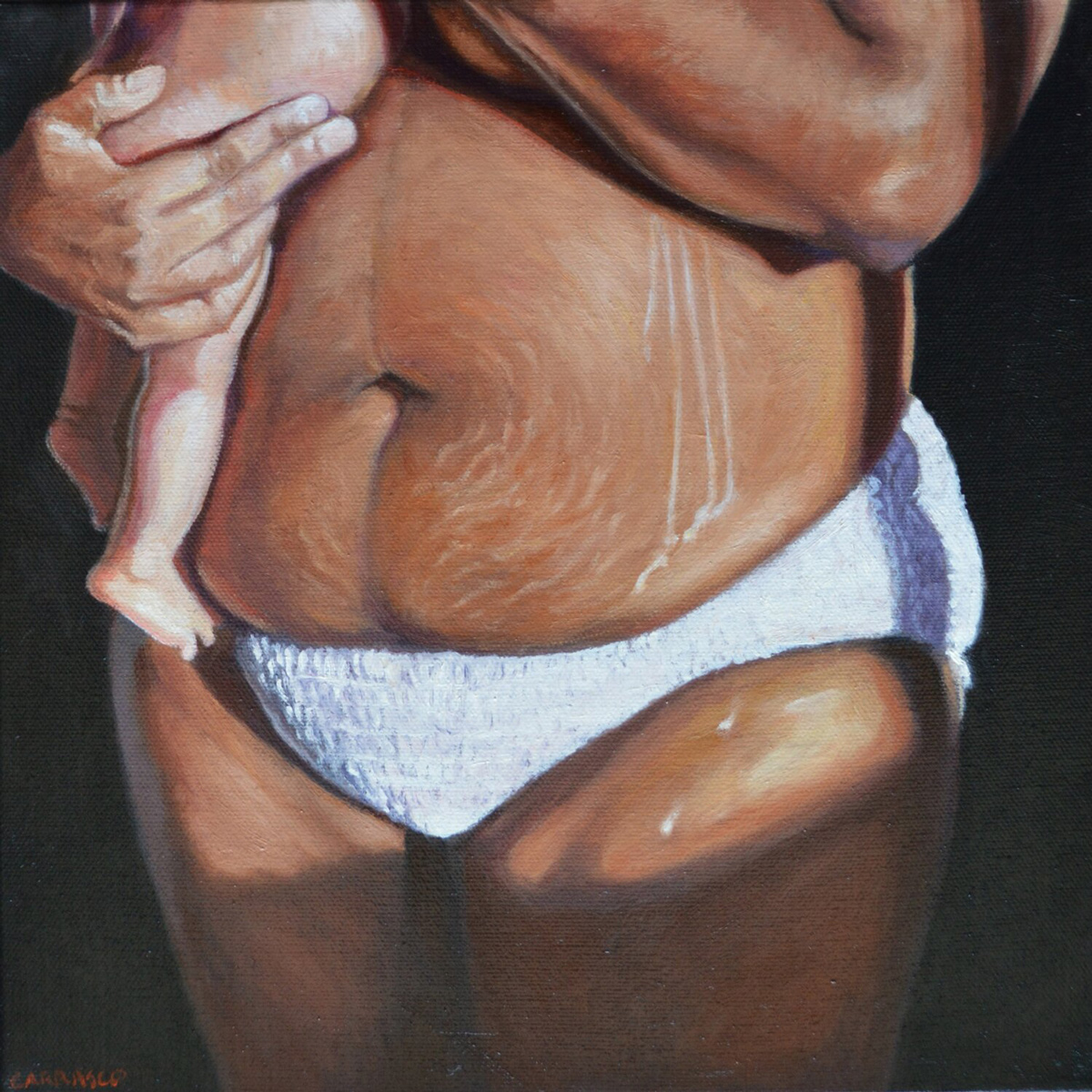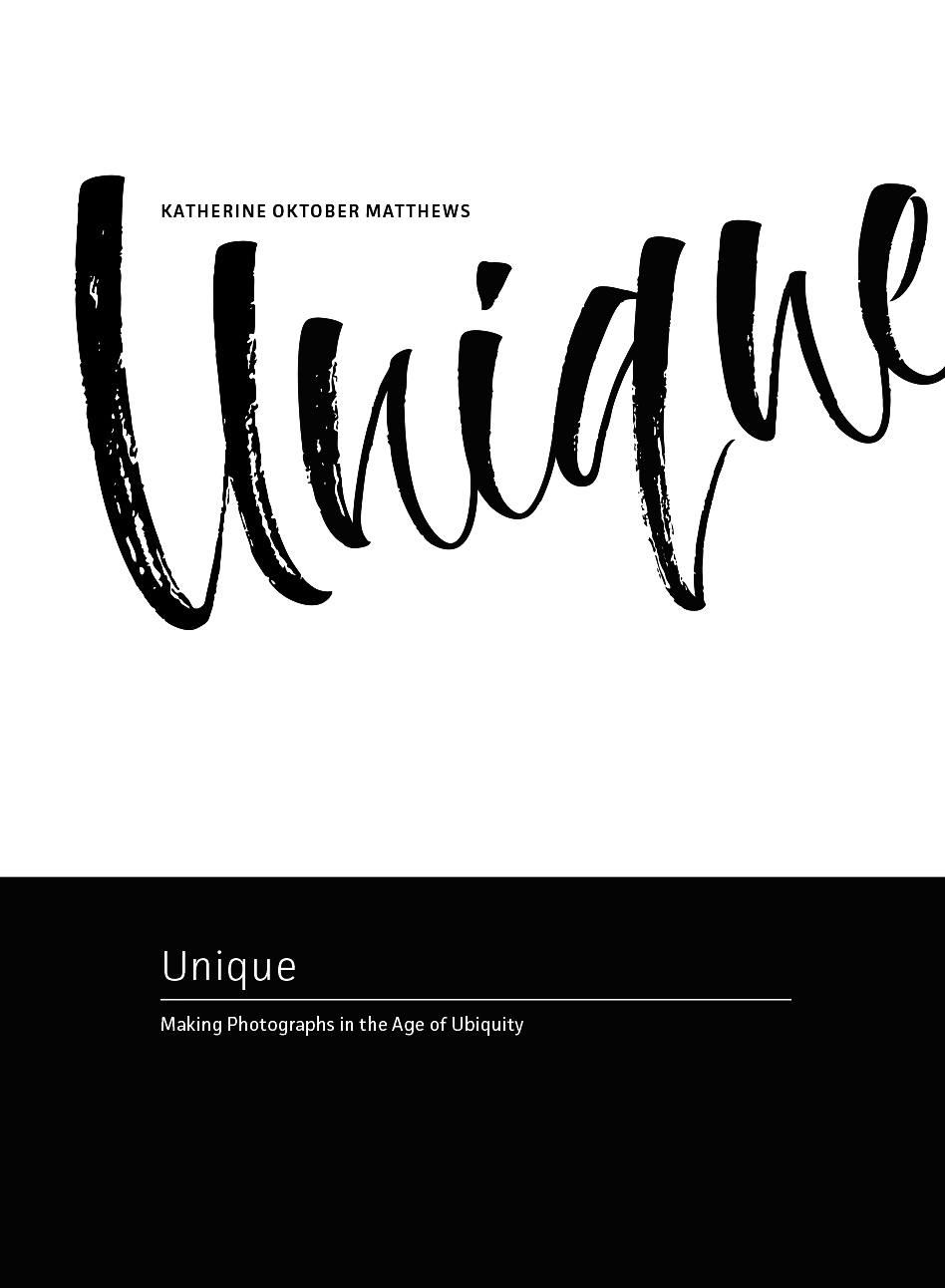"Literature is one way to remember that everybody else is suffering and that your imagination has to take in their suffering and their motives. If you really grant everybody mercy, you will get to the bottom of the truth."—Steve Almond, in our interview on storytelling.
#Blessed: On False Gratitude

It is a loaded phrase, both generically vague and universally meaningful: Everything happens for a reason. If you’ve been on the receiving end of this statement (and who among us has not been?) you’re aware that it can feel, in turn, as a much-needed call for perspective and as a hollow and impotent dismissal.
In her new book Everything Happens for a Reason: And Other Lies I’ve Loved (Random House, 2018), divinity professor Kate Bowler writes openly about her own confrontation with death. This book follows quite naturally, though obviously unanticipatedly, on her book Blessed: A History of the American Prosperity Gospel, which describes the history of televangelism and the teachings of prosperity. In short: if you want it, you can have it, if your devotion to God is sufficient. However, when Kate Bowler is smitten with cancer at the age of thirty-five, she finds herself confronted with the opposing logic: if you do not get what you want, there is something wrong with you and/or your faith.
Bowler takes us on a walk with her through, essentially, the stages of grief. There’s shock and denial, anger and bargaining… she’s doesn’t describe them in such a way, but there it is. What makes this noteworthy is that, to read her book, you’d be forgiven for thinking that she is the first person to die young, ever. She explains her personal stakes—she has a young son, a loving husband—and some of the greater challenges she has overcome previously—difficulty conceiving a child, a disability while writing her thesis. This is fuel added to the “this isn’t fair!” fire that she’s tending. It is, of course, unfair. The reason this is a problem is because of the nature of prosperity gospel: if your faith and life are aligned, you can have what you want.
She describes for us some examples from her life when God has seemed to answer her prayers, for example winning the grand prize at bingo, and of course getting pregnant after trying for a long time. She concludes the description of this by saying she felt she’d finally gotten her “own little prosperity gospel” and her students got for her in response some onesies with the word “BLESSED.” This is the crux of her tale: she is blessed, that is, looked upon with divine favor. Not grateful, that is, sculpting grace out of the crudeness of life.
Thus, feeling herself to be blessed rather than grateful, she then goes on to dismantle her beliefs with her diagnosis and surgery and treatments. She complains that people try to comfort her in cliché ways that she doesn’t want to hear (who say, in the clumsy language we all know, that there are still things to be grateful for, that it will work out, that everything happens for a reason, etc.). She complains about emails she receives, after she publishes an article in The New York Times about her experience, from strangers with reasons or advice or complaints themselves. She complains that older people who are dying seem to feel that their dying is on a par with her younger dying. She complains that people chide her for complaining. “The pain of the world is being calculated, and according to some, compassion can only be doled out by the teaspoon,” she writes, with no apparent sense of irony for the measurements that she doles out to the people who write to her or try to console her and fail. She writes at one point that “it is an unmerciful fact that some people have the right to look into my eyes and say, ‘You’re lucky.’,” somehow granting that other people suffer too, and with the same stroke judging that other people do not suffer sufficiently or equally to her. It’s here when I start to think the book should’ve been titled, “I Was Promised Special Treatment,” or simply, “Fuck You and Your Reasons.”
It makes me think of #blessed, and the superficial unloading of humblebrags. It is easy to feel blessed when the world is handing to you beauty, youth, health, love, prosperity, or any of the other many things that everyone agrees are symbols of, if not a recipe for, a happy and successful life. It is another thing to feel blessed, still, when those things are taken from you. I’m reminded, too, of Romeo throwing himself around Friar Lawrence’s quarters in a choleric fit, until the Friar corrects him:
“What, rouse thee, man! Thy Juliet is alive,For whose dear sake thou wast but lately dead—There art thou happy. Tybalt would kill thee,But thou slew’st Tybalt—there art thou happy.The law that threatened death becomes thy friendAnd turns it to exile—there art thou happy.A pack of blessings light upon thy back,Happiness courts thee in her best array,
But, like a misbehaved and sullen wench,
Thou pout’st upon thy fortune and thy love.”
—Romeo and Juliet (Act 3 Scene 3) by William Shakespeare.
I think of this in particular because I, too, have been a “misbehaved and sullen wench” who felt burdened not only by my traumas but for the expectation that I must be grateful. When you cannot muster gratefulness, though you know you should, it is a dark country.
Do things happen for a reason? I’ve written before that this question is connected to our irrepressible act of transforming stars into constellations, to make sense of the world through patterns and narration. It is our nature, and yet, I repeat: “Even if we can assume authorship of our choices, we cannot narrate with any legitimacy.” If a divine creature handed to us a reason for the events in our life—for example, “You tripped down the stairs so that a man down the street would not go into work, and therefore would not yell at a woman and get fired, so that he could be there four years from now when somebody needs his unique talent for opening a suitcase lock with a post-it note.”—would we accept it? Likely not. Even if we could fathom the explanation—and let’s be generous, we could not—we would still angle for a way to get what we want, especially when it’s our own life at stake. Because, despite the fact that we know we’re not, we still think we’re special.
Everything Happens for a Reason is a difficult read. It is a single-minded, egoistic narrative of a person in the throes of learning that they’re going to die: nothing has mattered until this, until me. For example, when her Times article is published, and the letters begin pouring in, she writes: “It feels as though the world has been cracked open, and it bleeds and bleeds.” Or, she recounts a story with her father-in-law, in which he muses that, “with age, it is one loss after another.” She thinks he has a point, until he applies it to his own life, and explains that he had to give up racquetball in his fifties. She writes to us, “Lord, save me from old people,” and tells us how she would scorn them when they complained about their failing bodies. Again, though death comes for us all, her death is special.
For those who are ill, and who are similarly searching for sense in the senseless, this book may provide some much needed consolation. For those who must care for, or live with, someone who is dying, this may offer some insight into the process of turning inward, when the turning upward has failed. As we see in Bowler’s story, death, like life, is not always possible to handle gracefully.
 Everything Happens for a Reason is published by Random House.
Everything Happens for a Reason is published by Random House.



